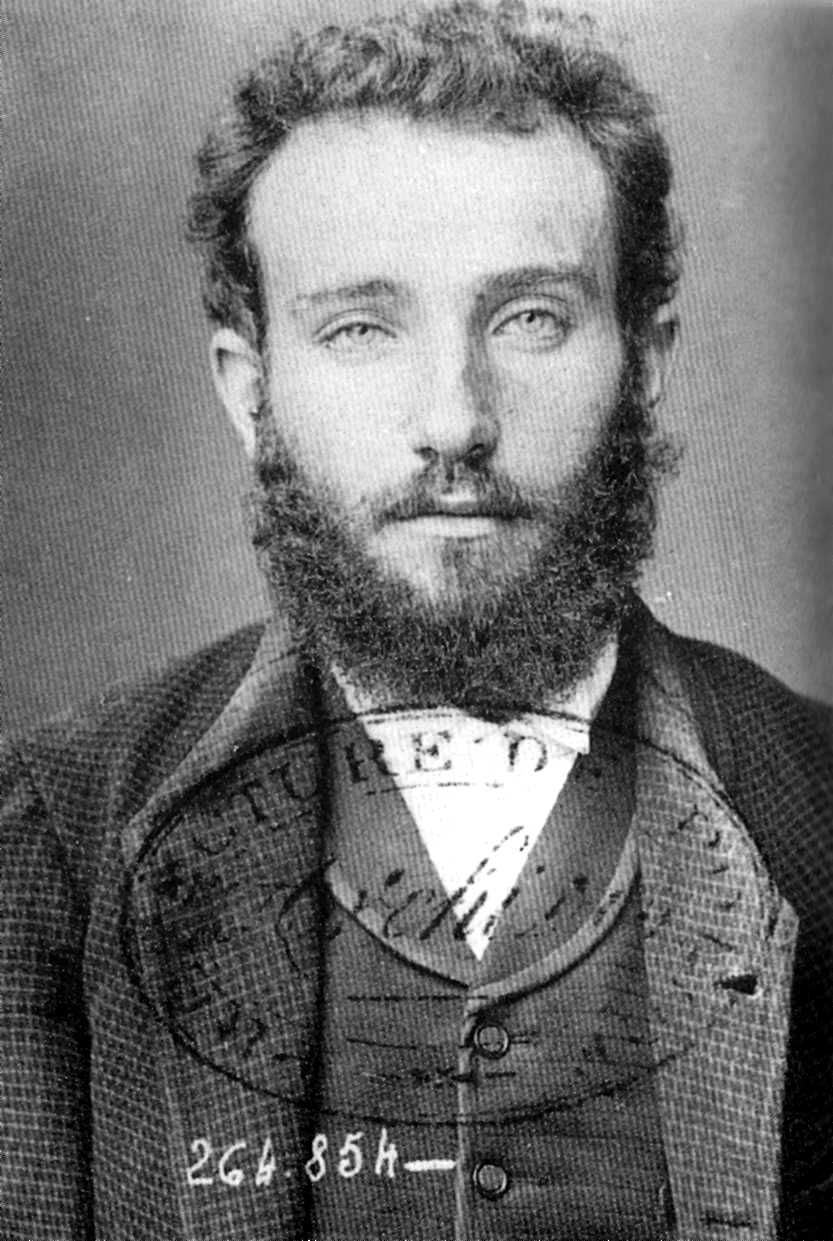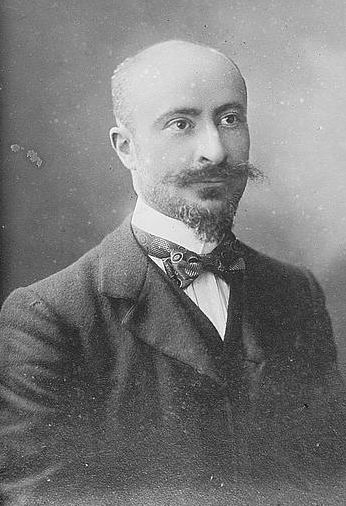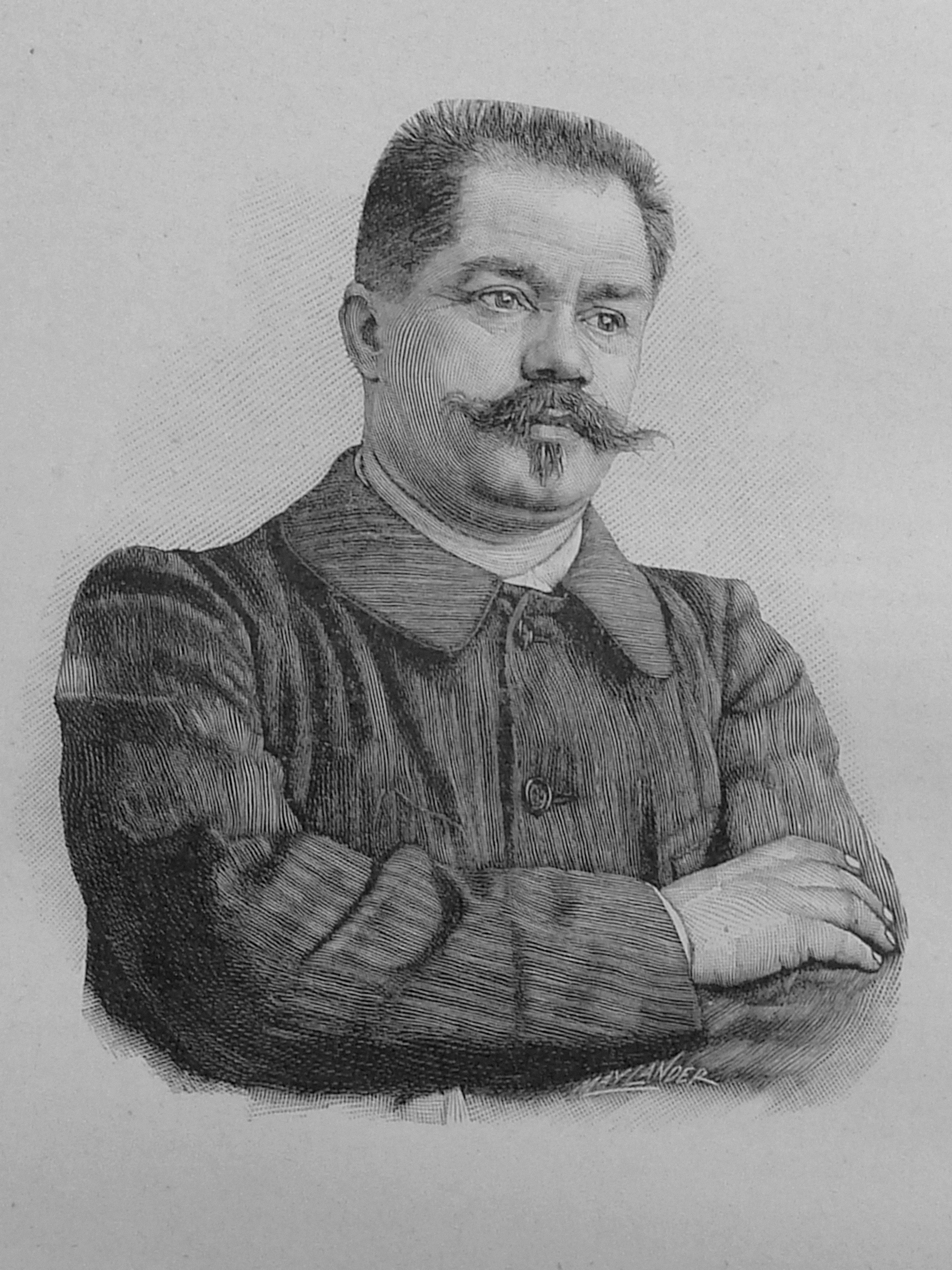|
Ãmile Janvion
Ãmile Janvion (10 April 1866 â 21 July 1927) was a French teacher, an anarcho-syndicalist leader, a founder of the ''ConfÃĐdÃĐration gÃĐnÃĐrale du travail'' (CGT) and a leader of the anti-militarist movement. He came to hold national syndicalist views that prefigured fascism. He was anti-Semitic, hostile to freemasonry, hostile to the republic and flirted with monarchism. However his main goal was the nationalization of the land and of the means of production. Life Early years Ãmile Janvion was born on 10 April 1866 in MÃĒcon, SaÃīne-et-Loire. He was given the nickname "''Pisse-vinaigre''" (vinegar piss). In 1893 he founded the first syndicate of employees of the prefecture. Janvion was one of the founders of the ''ConfÃĐdÃĐration GÃĐnÃĐrale du Travail'', (CGT â General Confederation of Labor). In 1896 he contributed towards the Parisian anarchist newspaper ''Le PÃĻre DuchÊne''. In 1897 Janvion and Jean DegalvÃĻs founded the ''Ligue d'enseignement libertaire'' (League of L ... [...More Info...] [...Related Items...] OR: [Wikipedia] [Google] [Baidu] |
MÃĒcon
MÃĒcon (), historically anglicised as Mascon, is a city in east-central France. It is the prefecture of the department of SaÃīne-et-Loire in Bourgogne-Franche-ComtÃĐ. MÃĒcon is home to near 34,000 residents, who are referred to in French as MÃĒconnais. The city gave its name to the nearby vineyards and wine 'appellation'. Geography The city lies on the western bank of the river SaÃīne, between Bresse in the east and the Beaujolais hills in the south. MÃĒcon is the southernmost city in the department of SaÃīne-et-Loire and the region of Bourgogne-Franche-ComtÃĐ. It is north of Lyon and from Paris. The climate is temperate with a slight continental tendency. Climate MÃĒcon features an oceanic climate (KÃķppen: ''Cfb''), with warm summers, slightly too cool to be called humid subtropical (''Cfa''). Winters are relatively cold to French standards, but milder and more rainy than north of MÃĒcon. Most precipitation is in spring and autumn. History Ancient and Medieval eras The ... [...More Info...] [...Related Items...] OR: [Wikipedia] [Google] [Baidu] |
Albert Libertad
Joseph Albert (known as Albert Libertad or Libertad) (24 November 1875 â 12 November 1908) was an individualist anarchist militant and writer from France who edited the influential anarchist publication ''L'Anarchie''. Life and work He was born in Bordeaux, and died in Paris. Abandoned by his parents as a baby, Libertad was a child of the Public Assistance in Bordeaux. As a result of a childhood illness, he lost the use of his legs, but put his handicap to good use, using his crutches as weapons against the police. He moved to Paris at 21, where he soon became active in anarchist circles, going so far as to live in the offices of the journal "Le Libertaire." A member of various anarchist groups, and a supporter of "propaganda by the deed," he was nevertheless an abstentionist candidate in Paris's 11th arrondissement in 1902 and 1904, seeing his candidacy as a means of spreading anarchist ideas. During the Dreyfus affair, he founded the Anti-Militarist League (1902) "and, along wit ... [...More Info...] [...Related Items...] OR: [Wikipedia] [Google] [Baidu] |
Languedoc
The Province of Languedoc (; , ; oc, LengadÃēc ) is a former province of France. Most of its territory is now contained in the modern-day region of Occitanie in Southern France. Its capital city was Toulouse. It had an area of approximately 42,700 square kilometers (16,490 square miles). History The Roman province of Gallia Narbonensis fell to the Visigothic Kingdom from the 5th to the 8th centuries. Occupied briefly by the Emirate of CÃģrdoba between 719 and 759, it was conquered and incorporated into the Kingdom of the Franks by Pippin the Short in 759 following the Siege of Narbonne. Under the Carolingians, the counts of Toulouse were appointed by the royal court. Later, this office became hereditary. Part of the territory where Occitan was spoken came to be called ''langue d'oc'', ''LengadÃēc'' or Languedoc. In the 13th century, the spiritual beliefs of the area were challenged by the See of Rome and the region became attached to the Kingdom of France following the ... [...More Info...] [...Related Items...] OR: [Wikipedia] [Google] [Baidu] |
Georges Darien
Georges Darien (pseudonym for Georges Hippolyte Adrien; 1862â1921) was a French writer associated with anarchism and an outspoken advocate of Georgism Georgism, also called in modern times Geoism, and known historically as the single tax movement, is an economic ideology holding that, although people should own the value they produce themselves, the economic rent derived from landâincluding .... Works Books * ''Bas les coeurs !'' (1889) * ''Biribi'' (1890) * ''Le Voleur'' (1897) * ''La Belle France'' (1898) * ''LâÃpaulette'' (1901) (not published) Pamphlets * '' Les Pharisiens'' Plays * ''L'ami de l'ordre'' (1898) References * Auriant (Alexandre Hadjivassiliou), ''Darien et l'inhumaine comÃĐdie'', Brussels: Ambassade du livre, 1966 * W.D. Redfern, ''Georges Darien: Robbery and Private Enterprise'', Amsterdam: Rodopi, 1985 * David Bosc, ''Georges Darien'', Ãditions Sulliver, 1996 * Valia GrÃĐau, ''Georges Darien et l'anarchisme littÃĐraire'', Editions du LÃĐ ... [...More Info...] [...Related Items...] OR: [Wikipedia] [Google] [Baidu] |
Jehan Rictus
Jehan Rictus (21 September 1867 â 6 November 1933) was a French poet. He was born Gabriel Randon in Boulogne-sur-Mer. In the 1900s, he legally changed his name to his mother's name Randon de Saint-Amand. After an unhappy childhood and poor beginnings in the life, Gabriel Randon took the pseudonym of Jehan Rictus. He found success in 1895 with poems that he interpreted in Parisian cabarets. These poems that Rictus interpreted, called ''Soliloques du Pauvre'' (Soliloquies of the Poor), were published in 1897. A few other volumes of verse followed, with ''Le Coeur populaire'' being published in 1914. At the time of World War I, he stopped publishing. He also forsook his anarchism for nationalist opinions. He is also the author of an autobiographical novel, ''Fil de fer'', and of a vast diary A diary is a written or audiovisual record with discrete entries arranged by date reporting on what has happened over the course of a day or other period. Diaries have traditionally been ... [...More Info...] [...Related Items...] OR: [Wikipedia] [Google] [Baidu] |
Charles Malato
Charles Malato (1857â1938) was a French anarchist and writer. He was born to a noble Neapolitan family, his grandfather Count Malato being a Field Marshal and the Commander-in-Chief of the army of the last King of Naples. Though Count Malato ferociously suppressed a popular anti-dynastic insurrection, his son â Charles' father â supported the communards of the Paris Commune, and was banished as a result to the penal colony of New Caledonia, where Charles was born. After the amnesty of anarchists and communists, Charles and his by that time ninety-year-old father returned to Paris, where they immersed themselves in the anarchist movement. On his return to France, Malato was condemned to fifteen months in prison for inciting murder, pillage and arson, and instead went into exile in London. Malato collaborated briefly with Victor Henri Rochefort, Marquis de Rochefort-Luçay before they fell out over the Dreyfus affair (Rochefort was an anti-Dreyfusard). He wrote for George ... [...More Info...] [...Related Items...] OR: [Wikipedia] [Google] [Baidu] |
Urbain Gohier
Urbain Gohier (born Urbain Degoulet, December 17, 1862 in Versailles – June 29, 1951) was a French lawyer and journalist best known for his publication of the anti-Semitic forgery ''The Protocols of the Elders of Zion'' in France. His pen name for two books was Isaac BlÞmchen. Orphaned as a young man, Gohier took the surname of his adoptive father, and the issue of his family origin remained a lifelong personal issue. A brilliant high school student at CollÃĻge Stanislas in Paris, he obtained a BA and a law degree. In 1884, he became editor of the royalist daily ''Le Soleil''. In 1897, upon the foundation of the socialist daily ''L'Aurore'', its director Ernest Vaughan called Gohier to join the writing team. He became a leading journalist there, along with Georges Clemenceau. An indefatigable pamphleteer, Gohier - a "monarchist-unionist" - maintained a policy that was pro-Dreyfus, anti-Semitic, anti-militarist, and socialist. He took a strongly anti-military posi ... [...More Info...] [...Related Items...] OR: [Wikipedia] [Google] [Baidu] |
Ãlie Faure
Jacques Ãlie Faure (April 4, 1873 in Sainte-Foy-la-Grande, France â October 29, 1937 in Paris) was a French doctor, art historian and essayist. He is the author of ''History of Art,'' considered a historiographical pillar in the discipline. Biography Youth and Training Ãlie Faure was the son of Pierre Faure, a merchant, and ZÃĐline Reclus. He was very close to two of his uncles, namely the geographer and anarchist activist ÃlisÃĐe Reclus and the ethnologist Ãlie Reclus. In 1888, he joined his brothers LÃĐonce and Jean-Louis in Paris and enrolled at the LycÃĐe Henri-IV, where he had as classmates in philosophy class LÃĐon Blum, R. Berthelot, Gustave HervÃĐ and Louis Laloy. Passionate about painting, he often visited the Louvre and immersed himself in the works of his philosophy teacher, Henri Bergson. With his baccalaureate in hand, he enrolled in the faculty of medicine and began practicing in working-class neighborhoods in Paris. He worked as an anesthesiologist ... [...More Info...] [...Related Items...] OR: [Wikipedia] [Google] [Baidu] |
Lucien Descaves
Lucien Descaves (16 March 1861â 6 September 1949) was a French novelist. Selected works * ''Le Calvaire de HÃĐloÃŊse Pajadou'' (1883) 'HÃĐloÃŊse Pajadou's Calvary.'' Sunny Lou Publishing , 2021 Further reading * * External links * * Archive oLucien Descaves Papersat the International Institute of Social History The International Institute of Social History (IISH/IISG) is one of the largest archives of labor and social history in the world. Located in Amsterdam, its one million volumes and 2,300 archival collections include the papers of major figu ... 1861 births 1949 deaths Writers from Paris 19th-century French novelists 20th-century French novelists Place of death missing French male novelists 19th-century French male writers 20th-century French male writers {{France-novelist-19thC-stub ... [...More Info...] [...Related Items...] OR: [Wikipedia] [Google] [Baidu] |
Zo D'Axa
Alphonse Gallaud de la PÃĐrouse (28 May 1864 â 30 August 1930), better known as Zo d'Axa (), was a French adventurer, anti-militarist, satirist, journalist, and founder of two of the most legendary French magazines, ''L'EnDehors'' and ''La Feuille''. A descendant of the famous French navigator Jean-François de Galaup, comte de LapÃĐrouse, he was one of the most prominent French individualist anarchists at the turn of the 20th century. Life D'Axa was a cavalryman but deserted to Belgium and was exiled to Italy in 1889. There he ran an ultra-Catholic newspaper and seduced the native womenfolk. According to popular myth, d'Axa during his time in Italy was hesitating between becoming an anarchist or a religious missionary when he was accused (wrongfully, he contended) of insulting the Empress of Germany, and was made an anarchist by the subsequent legal proceedings against him. He spent the next few years being pursued from one country to the next by the police, before taking adva ... [...More Info...] [...Related Items...] OR: [Wikipedia] [Google] [Baidu] |
Miguel Almereyda
EugÃĻne Bonaventure Jean-Baptiste Vigo (known as Miguel Almereyda; 5 January 1883 â 14 August 1917) was a French journalist and activist against militarism. He was first an Anarchism, anarchist and then a socialist. He founded and wrote in the newspaper ''La Guerre sociale'' and the satirical weekly ''Le Bonnet rouge''. During World War I (1914â18) he engaged in dubious business dealings that brought him considerable wealth. He became engaged in a struggle against right-wing forces, and was eventually arrested on the grounds of being a German agent. He died in prison at the age of 34, almost certainly murdered. He was the father of the film director Jean Vigo. Early years EugÃĻne Bonaventure Jean-Baptiste Vigo was born on 5 January 1883 in BÃĐziers, HÃĐrault, France. His father was engaged in trade, born in Saillagouse, and his mother Marguerite AimÃĐe Sales was a seamstress from Perpignan. The family originated in Err, PyrÃĐnÃĐes-Orientales. His grandfather, from a family of m ... [...More Info...] [...Related Items...] OR: [Wikipedia] [Google] [Baidu] |
An Enemy Of The People
''An Enemy of the People'' (original Norwegian title: ''En folkefiende''), an 1882 play by Norwegian playwright Henrik Ibsen, followed his previous play, ''Ghosts'', which criticized the hypocrisy of his society's moral code. That response included accusations of both ''Ghosts'' and its author being "scandalous," "degenerate," and "immoral." In ''An Enemy of the People'', a man dares to expose an unpalatable truth publicly and is punished for it. However, Ibsen took a somewhat skeptical view of his protagonist, suggesting that he may have gone too far in his zeal to tell the truth. Ibsen wrote to his publisher: "I am still uncertain as to whether I should call 'An Enemy of the People''a comedy or a straight drama. It may avemany traits of comedy, but it also is based on a serious idea." Plot overview Act I Dr. Thomas Stockmann is the medical officer of a recently opened spa in a small town. The play begins with a dinner party hosted by Dr. Stockmann and his wife, Katrine. Th ... [...More Info...] [...Related Items...] OR: [Wikipedia] [Google] [Baidu] |







